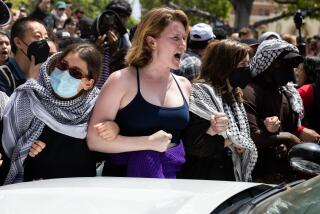‘Boycott’ Captivatingly Recalls Civil Rights Fight
- Share via
“Coloreds to the rear.”
That’s what African Americans in Montgomery, Ala., heard until late in 1956, when the U.S. Supreme Court found the state’s bus segregation laws unconstitutional. The ruling capped a 381-day boycott of Montgomery buses by blacks that revved up the nation’s civil rights movement and thrust to prominence a charismatic young minister named Martin Luther King Jr.
This becomes two hours of captivating TV as HBO’s “Boycott,” a crisp, fly-on-the-wall, documentary-style account of a strategic act of defiance ignited by local NAACP secretary Rosa Parks’ refusal to surrender her “whites only” seat for one at the back of the bus.
Although not the first, it was the most pivotal black resistance to segregation in public transportation, which found Montgomery’s African Americans having to pay their fares at the front, then leave the bus to board at the rear. Most passengers were black and were relegated to the rear even if entire sections of white seats were vacant. And by practice, if not by law, blacks could be required to give up their seats to any whites who were standing.
Clark Johnson’s skilled deployment of hand-held cameras and grainy film here recalls NBC’s “Homicide: Life on the Street,” where he played Det. Meldrick Lewis and directed some episodes before moving on to directing other high-profile dramas.
His “Boycott” success would not be possible without an effective script by Daniel Farrell III and Timothy J. Sexton, based on a Stewart Burns book, “Daybreak of Freedom,” and without Jeffrey Wright’s persuasive King. He was just in his 20s and recently in from Atlanta with his wife, Coretta (Carmen Ejogo), when elected to boycott leadership by the newly formed Montgomery Improvement Assn.
Few acting tasks are harder than capturing the mesmerizing allure and distinctive rhythms of a figure as fresh in the public mind as King. Yet somehow Wright does it with a performance that is not thundering but life-sized, giving off quiet magnetism while crescendoing in all the right places.
This is not meant to be the definitive King, only a narrowly framed portrayal of the boycott and his leadership of it, and also the pressures it imposed on his family and other African Americans who joined in after that unlikely rebel, the quiet-spoken, prim-looking Parks, did her thing.
After being found guilty of violating a segregation statute, Parks (Iris Little-Thomas) refuses to pay her $10 fine, and we’re off, with King ultimately unifying the city’s fractious black leadership, and Ralph Abernathy (Terrence Howard) often beside him as a one-day protest stretches into a grueling marathon. Tested here, by white taunts and attempts at intimidation, are the wills of such local black leaders as Jo Ann Robinson (CCH Pounder) and seething E.D. Nixon (Reg E. Cathey), and also King’s own allegiance to nonviolence. Yet hardly anyone buckles.
Still, Montgomery’s racist leaders believe they can outlast the boycotters. So especially on point here is a scene with two of these smug white dinosaurs talking strategically about “waiting them out” as if the African American man shining their shoes, and hearing every word, were invisible.
To them, he is--a display of decadence as stereophonic as the high court’s coming decision proclaiming equality for black bus riders.
*
* “Boycott” can be seen tonight at 9 on HBO. The network has rated it TV-PG-D (may be unsuitable for young children, with special advisories for suggestive dialogue).
More to Read
The complete guide to home viewing
Get Screen Gab for everything about the TV shows and streaming movies everyone’s talking about.
You may occasionally receive promotional content from the Los Angeles Times.






